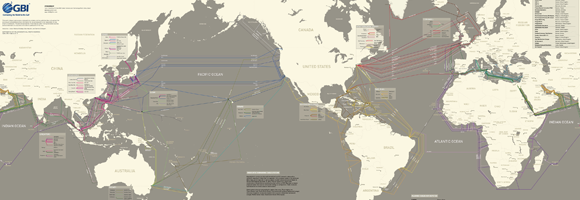telegeography
Amazing, how associations creep up involuntarily. When ↑Mark McGuire ↵asked if ↑Cyberanthropology was available in English, I had to answer ‘I’m afraid, but, no,’ and at the same time thought, ‘but there is a book-length unpublished manuscript in English on my HDDs.’ Then I saw the link to ↑TeleGeography’s map gallery at the ↑ethno::log and was reminded of a passage from said manuscript, ranting about the macroscopic hardware aspect of information technology:
When you are doing offline fieldwork in, say, the tropical belt, you have to be able to find your way around in the rainforest, have to know about its dangers, and how to circumvent them, have to have basic, tangible knowledge. First of all a forest is a forest, and not the dwelling place of the deceased, mythical ancestors. It may well be the latter, too—but that comes later. My point is that you can not start with what people envision the forest to be, or—even worse—what academics envision the people there envision the forest to be. The rainforest is an aggregation of plants and animals, interacting all but haphazardly—a complex biological ecosystem. This is what you have to start out with, or—in the worst case—you will not even live long enough to grasp the ancestor thing.
This leads to my second point of evidence fortifying my suspicion, that slippery paths are taken in some academic research on the online realm—blatant misconceptions of the technology at work. You have to know the forest first.
In analogy to the forest, the Internet first of all is an aggregation of software and hardware, and not ‘a social practice.’ There are the machines in which data is stored, and on which applications run. Then there are the connections between the machines—copper wires, fibreglass lines, radio links, satellites in orbit, etc. Finally there is the protocol stack, governing and managing the connections, its open standards enabling the Internet to be a ‘net of networks,’ and allowing it to grow, or change, in size, dimensions, and qualities in an unpredictable fashion.
Above that the mentioned machines are computers in the modern sense, which first of all are Universal Turing Machines, having become manifest as digital electronic technology—ultimate cybernetic systems, able to alter themselves on the software level. Nothing more, but nothing less either. Actually, that already is quite something.
You do not have to be a cutting-edge computer scientist or communications engineer, when you strive to do anthropological fieldwork online. Just as you do not have to be a botanist or eco-system buff when choosing the rainforests—but it would not hurt. The technical basics have to be grasped, or the traps of virtualism become close to inevitable.
And so on.
The point I am trying to make is not one in the direction of cultural materialism. rather I am advocating a certain honesty of the fieldworker towards her/himself. When we’re going into the rainforest we first of all envision it in terms of our own enculturation, which is heavily informed by the natural sciences. There’s no use in denying that. To the contrary, embrace it, become fully conscious of it, reflect on it, then you’ll have a chance to tap into other visions, too.
So, a revitalisation of the old ties between geography and anthropology may well make sense. Even in respect to fieldwork online.
Beyond that I simply am fascinated by the historical ↑transatlantic telegraph cable, and ↑Cyrus West Field (1819-1892) is a hero of mine ;-)


